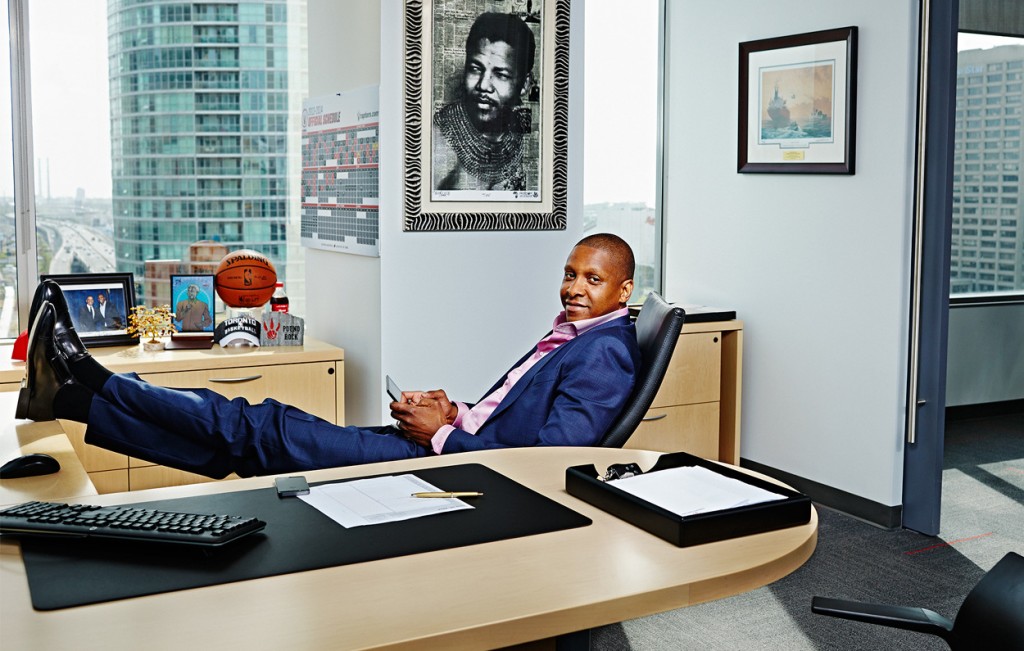The Toronto Raptors continued to lock up the core pieces of the most successful run in franchise history on Friday, signing president Masai Ujiri to a multi-year contract extension.
“I am grateful to the Board and Mr. (Larry) Tanenbaum for the opportunity to continue our progress to build the Raptors into one of the top franchises in the NBA,” Ujiri said in a release. “I’m also excited that Jeff and Bobby are being rewarded for their hard work and valuable contributions to our program.
“My family thanks the NBA, Raptors players and coaches, staff, Raptors fans, the city of Toronto and Canada for this opportunity. Toronto is home for us.”
And yes, we say “president” alone and not president-slash-general manager, because Ujiri is now solely the team’s president of basketball operations. That’s an important distinction, as it’s allowed the team to promote Jeff Weltman from assistant general manager to general manager, and to promote Bobby Webster to Weltman’s old post (assistant general manager, while retaining his title as vice-president of basketball strategy). By losing the G.M. part of his title, Ujiri’s enabled the Raptors to retain important executives by offering growth in both role and responsibility, important considerations given how well thought of both Weltman and Webster are both in and outside of the organization.
Terms of the deal were not disclosed, but it’s safe to assume Ujiri will receive a substantial raise from the five-year, $15-million contract he signed in 2013, one that had two years remaining. Locking Ujiri up with an extension now precludes him from becoming a lame duck entering next summer while also standing as a pre-emptive strike against any idea other teams could come calling for the former (and nearly once-again) Executive of the Year. Expect Marc Stein of ESPN, who first reported these extension negotiations on Aug. 11, to have financial information sometime soon.
As far as the impact on the Raptors organization, it’s something I covered in detail back when Stein first reported it. I’ll direct you there for my bigger-picture thoughts, but here’s a snippet:
From Toronto’s perspective, they lock up a GM who was sure to be sought after once he was a lame duck, and they do so before any rumors can surface about his potential flight risk. Beyond that, Ujiri’s been at the helm for the best three-year stretch in franchise history as well as its single deepest playoff run, and he’s accomplished those goals while maintaining roster flexibility and keeping an eye toward developing youth at the same time. He was instrumental in the rapid introduction of a D-League affiliate in Mississauga and the BioSteel Centre in Toronto (and shout out to Tim Leiweke, who landed Ujiri and helped a great deal with increasing infrastructure and exposure for the Raptors in his short time), and the franchise recently allowed him commit to head coach Dwane Casey and All-Star guard DeMar DeRozan long-term.
For Ujiri, he gets to stay in a city he loves, with a franchise that’s given him the tools to succeed, as well as to help push his charitable endeavors. He seems a spiritual match with MLSE from a corporate citizenship perspective, and the loss of Leiweke hasn’t led to any change in organizational structure or approach that’s affected Ujiri. He’s the man calling the shots on the basketball side, the organization gives him what he needs (again, see BioSteel and his claims they can spend into the luxury tax once they’re in a cap situation where they’re actually able to do so), and he’s able to freely continue to help build basketball in Africa (Ujiri, the league’s first African-born GM, is actually there right now with Giants of Africa).
…Perhaps more importantly than anything else, this echoes the strong signals of stability the Raptors have been sending for some time. Once a moribund franchise known for losing and for its remarkably high turnover – on the roster, behind the bench, and in the front office – the Raptors continue to move forward with the same core throughout the organization. Their reputation has improved as a result, aided by Ujiri’s apparent ability to relate to players and make an impression, plus the city of Toronto’s general growth in popularity, which the All-Star Game only aided. That momentum can take time to manifest into an actual move or competitive advantage, but it would be impossible to argue the Raptors aren’t the healthiest they’ve ever been right this moment.
Ensuring Weltman, who was one of Ujiri’s first targets when he took over the job three years ago, is around a while longer and that Webster can continue to grow within the org only furthers the thought that the Raptors are in good, stable hands. Weltman was a potential candidate to be poached for a G.M. job in the near future, and Webster, whom the Raptors plucked from the league office, is considered a rising star. Along with Ujiri, Weltman, and Webster, the Raptors have locked up two-time All-Star DeMar DeRozan and head coach Dwane Casey, and they should be primed for a fourth consecutive playoff appearance, a franchise first.
“The gratitude and respect we hold for Masai and our Raptors senior management team are reflected in our Board’s action to extend Masai’s contract,” said Tanenbaum, the chairman of the board. “We are excited to build on our team’s success and to give Masai our full support in delivering to our fans and to our country the Toronto Raptors’ first NBA championship.”
“The stability this move brings is important for the team and its fans and we look forward to building on the Raptors’ success under Masai’s continued leadership,” MLSE president and CEO Michael Friisdahl added.
Not to be to backward-looking, but today feels like a great day to sit back and appreciate how far this franchise has come, and that re-upping an entire front office seemed a no-brainer that should affirm to fans that the team is in good hands and moving in a positive direction.



